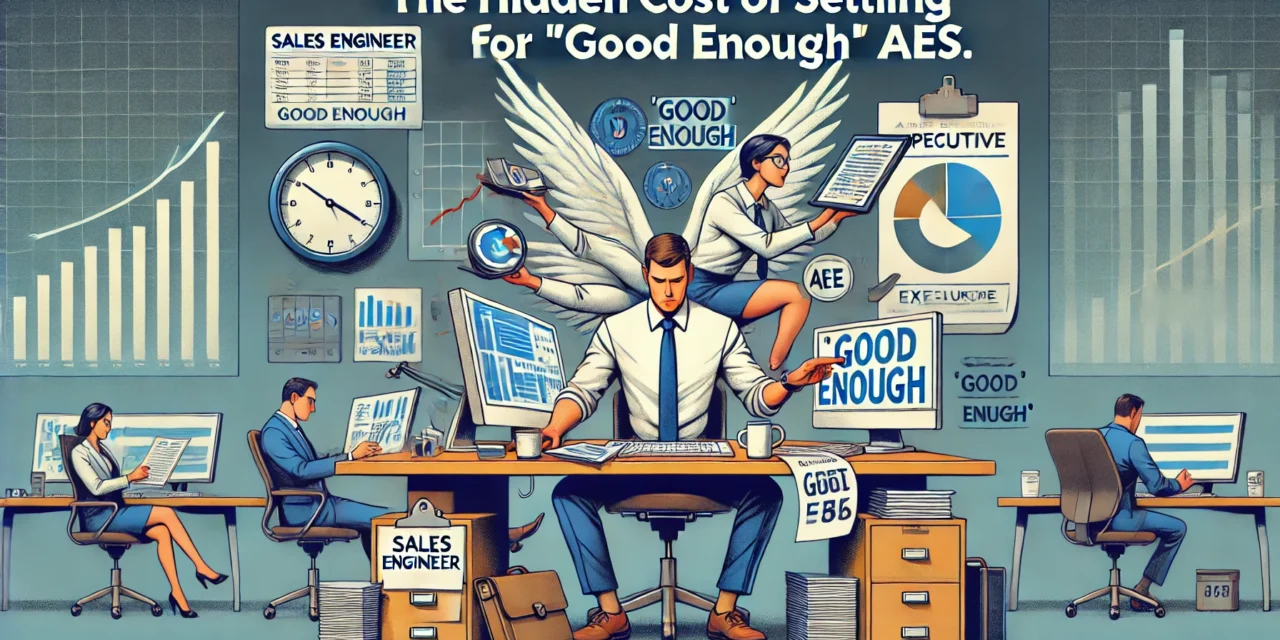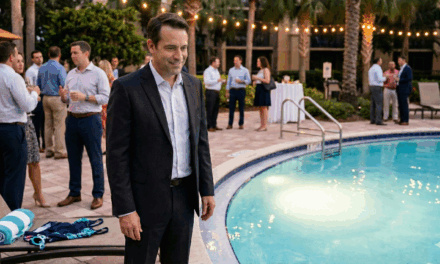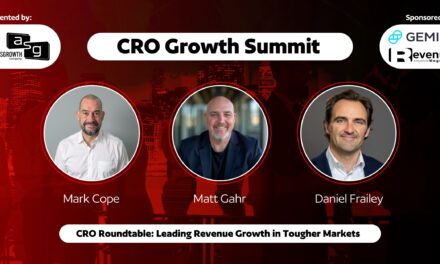
The Hidden Cost of Settling for ‘Good Enough’ AEs

Warning: Hot Take coming your way.
This is by no means supposed to be judgmental, but only to share a perspective that is likely occurring with in your sales teams, if you have okay AE’s matched with wow SE’s.
Do you have a “eh… they’re okay” AE on your team? They close deals, but barely? Do they slack on the details but people seem to “like them in calls”?
Get rid of them. While deals may still get signed, I’m willing to bet that the behind-the-scenes story of how that deal actually closed – has two different ones. I’d venture a guess that the SE (sales engineer) was working overtime to cover for an AE who’s not holding their end of the sales process. This setup isn’t sustainable and it WILL cost you valuable resources, especially if the “eh” AE is partnered with a high quality SE.
If you’re a leader, it’s time to pay attention to the “eh” AEs.
Yes – deals are still progressing and moving forward – but you have to think long term. You are going to have a problem on your hands if you don’t trim the fat.
Low-quality AEs are the ones who just wing it and show up, call charm, and big promises, but lack the follow-through. They win deals by leaning heavily on the SE’s work and expertise—letting the SE handle not just the technical heavy lifting, but also the strategy, objections, and anything else the prospect asks for. This AE has a “just make it happen” or “just do what you did last time” attitude. This AE fears losing the deal, while the SE fears a lot more. They fear losing credibility, trust and expertise – because of these differences – a high quality SE will fill the gaps- because they feel like they have to.
This AE style burns through SEs. They’re piling up extra work for their SE to fill in the gaps, overloading them with additional client requests, rehashing details the AE should’ve clarified, and even pushing contract questions the AE should be handling. While the AE might look successful in terms of numbers, their success rests on an unsustainable foundation—the SE’s extra labor and patience.
A good SE doesn’t just support a deal—they’re the glue keeping it together. They understand the prospect’s needs, speak directly to their pain points, and adapt the demo on the fly. They might not be handling the contracts, but they’re setting the stage for everything that follows, building trust that keeps the prospects invested.
The Risk of Ignoring Your SE’s Complaints
The thing is, a high-quality SE probably will not speak up at first. They might try to carry the extra load and step in to make sure the deal succeeds. They may want to avoid “rocking the boat” or causing tension. But if you start to notice a trend of the SE expressing frustration, lack of clarity from the AE, or feeling overwhelmed, it’s time to listen carefully. An SE who feels unheard in their concerns about an AE will, over time, feel less motivated to go above and beyond, and you risk losing them altogether.
For the SE, it’s not just about getting credit; it’s about having a partner who respects and reciprocates the work they put into every deal. When the relationship feels lopsided, the SE begins to feel like they’re working two roles—technical expert and account executive—without the support, compensation or recognition to match.
Why You Can’t Afford to Burn Out Your SE
Burning out your SE means risking not only the current deals they’re working on but also your long-term sales pipeline. High-quality SEs aren’t easy to find, and when they burn out, your company suffers. The sales engineering teams understand your product inside and out, they translate technical value into business impact, and bring customers across the finish line. In my experience an AE can be ramped, taking deals and closing in the first 90 days, while a SE can take 6 months to be impactful and another 3-6 months (depending on the complexity of the solution) to be fully ramped.
When they’re burnt out, the first signs might be subtle: missed details, a drop in engagement, or even a slight dip in the usual spark they bring to their work. Eventually, if they don’t feel heard or supported, you’ll start to see the real impact in fewer closed deals, longer sales cycles, and strained relationships with customers who’ve come to rely on the SE’s expertise.
All those wins the “just okay” AE has will start slipping because your SE is too overwhelmed to keep picking up the slack.
How to Support Your SE and Strengthen the AE-SE Partnership
If you’ve recognized any of this happening within your team, it’s time to act. Here are a few steps to keep your SE from burning out and to build a stronger partnership between your AE and SE:
- Address the Imbalance – Talk to your AE. Lay out the areas where they need to step up, from follow-ups to contracting, and hold them accountable. Clarify that while the SE is there for product and technical expertise, the AE owns the deal process end-to-end.
- Listen to Your SE – If your SE is voicing concerns about their workload or the AE’s handling of a deal, take it seriously. Act on it by finding ways to either distribute tasks more evenly or coach the AE on effective deal management.
- Define Clear Roles and Expectations – Make sure the AE knows where their role begins and ends, and the SE knows they’re there to complement, not replace, the AE’s work. When both roles are defined, it’s easier to set boundaries and allows for easier interventions if expectations are not being met.
- Recognize and Reward SEs’ Contributions – Acknowledge the work your SE is putting in to close deals. Recognizing their efforts—especially when they’re filling in for a struggling AE—can go a long way in boosting morale and showing appreciation.
It’s easy to overlook a few rough edges when the deal numbers are good. But if your AE is closing deals at the expense of an SE’s bandwidth, there’s a cost to that success. The extra work your SE is putting in isn’t invisible, and if it keeps going unchecked, you’ll find that your SE is the one the quietly keeping deals together.
Supporting your SE doesn’t just help them feel valued; it protects your business. Listen when your SE raises concerns, address imbalances between AEs and SEs, and recognize that a winning deal isn’t truly a win if it comes at the cost of a high-quality SE doing double duty.
So, the next time your SE says, “Hey, I’m doing all the follow-up here,” pause and pay attention.
You’ll keep getting wins. You’ll build a stronger team, and avoid the cost of losing one of your most valuable assets.

































